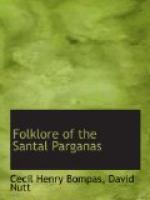him a sickle and he went off to the fields. When
he got there, he noticed how bright the sickle looked,
and when he touched it, he found it quite hot from
being carried in the sun. “Dear, dear,”
said he, “I cannot let this sickle reap the
rice: it is so hot that it must have very bad
fever; I will let it rest in the shade until it gets
better,” so he laid it down in a shady spot
and began to stroll about. Presently up came the
farmer, and was very angry to find no work going on.
“Did I send you out to stroll about, or to start
cutting the rice?” roared he. “To
cut the rice,” answered the merchant’s
son, “but the sickle has fallen ill with high
fever and is resting in the shade; come and feel how
hot it is.” “You are nothing but
an idiot,” answered the farmer. “You
are no good here; go back home and start a fire in
the big house and boil some water by the time I get
back.” The merchant’s son was only
on the lookout for an excuse to annoy the farmer and
the words used by the farmer were ambiguous; so he
went straight back to the farm and set the biggest
house on fire. The farmer saw the conflagration
and came rushing home and asked the merchant’s
son what on earth he meant by doing such mischief.
“I am only doing exactly what you told me; nothing
would induce me to disobey any order of yours, my worthy
master.” The farmer had nothing more to
say; his words would bear the construction put upon
them by the merchant’s son, and he was afraid
to dismiss him lest he should have to lose his little
finger; so he made up his mind to get rid of this
inconvenient servant in another way, and the next
day he called him and told him that he must send word
to his father-in-law of the unfortunate burning of
the house, and the merchant’s son must carry
the letter.
The latter accordingly set off with the letter, but
on the road he thought that it would be just as well
to see what the letter was really about; so he opened
it and found that it contained a request from the
farmer to his father-in-law to kill the bearer of the
letter immediately on his arrival. The merchant’s
son at once tore this up and wrote another letter
in the farmer’s name: saying that the bearer
of the letter was a most excellent servant and he wished
him to marry into the family; but that as he himself
had no daughters he hoped that his father-in-law would
give him one of his daughters to wife. Armed
with this he proceeded on his journey. The father-in-law
was rather surprised at the contents of the letter
and asked the merchant’s son if he knew what
it was about; he protested complete ignorance:
the farmer had told him nothing, and as he was only
a poor cowherd, of course he could not read.
This set suspicion at rest; the wedding was at once
arranged and duly took place, and the merchant’s
son settled down to live with his wife’s family.
After a time the farmer got news of what had happened,
and when he saw how the merchant’s son had always
been sharp enough to get the better of him, he began
to fear that in the end he would be made to cut off
his finger; so he sought safety in flight. He
ran away from his house and home and was never heard
of more.




